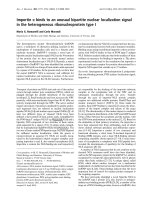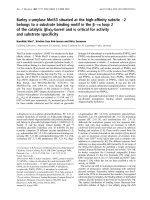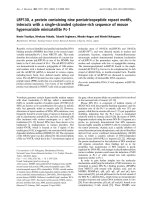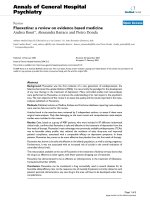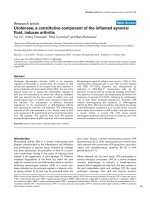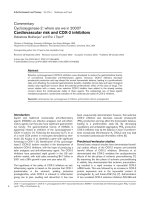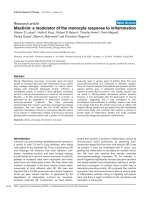Báo cáo y học: "Commentary – a Potato, potšto, proxy consent, permission – just don’t call the whole thing off" potx
Bạn đang xem bản rút gọn của tài liệu. Xem và tải ngay bản đầy đủ của tài liệu tại đây (34.7 KB, 2 trang )
123
Available online />Abstract
Research involving critically ill persons highlights challenging
questions surrounding third party authorization. The ethical and legal
viability of research involving persons who do not have the capacity to
consent to participation is not universally accepted, and inconsistent
standards are reflected in research ethics guidelines, law and
practice. In order to ensure that research participants who are
considered incapable of consenting to research are appropriately
protected, and that minimal risk research on illnesses affecting those
who are unable to consent is enabled, clear and justifiable parameters
must be created and, where they are already established, they must
be made more transparent.
Introduction
Research involving critically ill patients highlights challenging
questions surrounding third party authorization. Can a proxy
decision maker consent to research on another’s behalf? Can
a researcher enrol someone who is considered unable to
consent, when the research is not specifically in that person’s
best interests? The ethical and legal viability of research
involving persons who do not have the capacity to consent to
participation is not universally accepted [1], and inconsistent
standards are reflected in research ethics guidelines, law and
practice. Some argue that inconsistent parameters for proxy
authorization may have a ‘chilling’ effect on research involving
incapable persons, and may result in researchers and
research ethics committee members living in fear of liability
[2–4]. Others point to little awareness among researchers of
the rules governing surrogate consent to research [5]. Given
that categorically excluding from research those persons who
are unable to consent for themselves would deprive them of
proven treatments designed to meet their requirements,
participation should be allowed, subject to safeguards.
A range of perspectives
There are a wide range of references to third party
authorization in research ethics documents and case law. The
Nuremberg Code [6] precludes any research on persons
without their consent. The World Medical Association’s
Declaration of Helsinki [7] states that for a ‘research subject
who is legally incompetent, physically or mentally incapable of
giving consent or is a legally incompetent minor, the
investigator must obtain informed consent from the legally
authorized representative in accordance with applicable law’.
The International Conference on Harmonisation (ICH)
Harmonised Tripartite Guidelines: Good Clinical Practice
document [8] uses the Helsinki language and defines ‘legally
acceptable representative’ as ‘an individual or juridical or
other body authorized under applicable law to consent, on
behalf of a prospective subject, to the subjects’ participation
in the clinical trial’. The Belmont Report from the USA [9]
holds that, ‘individuals should be treated as autonomous
agents and … persons with diminished autonomy are entitled
to protection’, meaning that the permission of ‘other parties’
may be sought. The Tri-Council Policy Statement from
Canada [10] states that, ‘Research … may begin only if (1)
prospective subjects, or authorized third parties, have been
given the opportunity to give free and informed consent …’.
Case law, much like the guidelines, offers both examples of
support and barriers to third party authorization [2].
Notwithstanding the general commitment to third party
authorization included in most of the above documents, there is a
common underlying distinction between research in the pursuit
of knowledge with a possibility and added intent of improving the
patient’s health, and research that simply aims to extend
knowledge with no attempt at improving the patient’s health.
Ethics
The obligation of researchers to treat patients as autonomous
actors who must provide informed and voluntary consent to
participate in research is grounded in the ethical principle of
respect for persons. Requirements for parental or guardian
permission are grounded in the ethical obligation of
researchers to respect and protect vulnerable individuals.
Provisions for involving potential participants who are
Commentary
Pota
–
to, potšto, proxy consent, permission – just don’t call the
whole thing off
Randi Zlotnik Shaul
Bioethicist, Bioethics Department, The Hospital for Sick Children, Toronto, Ontario, Canada, and Lecturer, Department of Paediatrics,
University of Toronto, Toronto, Ontario, Canada
Corresponding author: Randi Zlotnik Shaul,
Published online: 7 January 2005 Critical Care 2005, 9:123-124 (DOI 10.1186/cc3037)
This article is online at />© 2005 BioMed Central Ltd
a
124
Critical Care April 2005 Vol 9 No 2 Shaul
considered incapable of providing informed consent to
research in discussions about research participation and
seeking their assent, where appropriate, reflect respect for
the individuals’ level of autonomy. Permission and assent are
the foundations of ethical research involving those who do
not have the capacity to consent to research [11].
Law
The use of third party authorization must comply with the
legal requirements of the jurisdiction where the research is
taking place. In many jurisdictions, proxy consent can only be
given for treatment decisions. When research is intended on
individuals who are incapable of providing informed consent,
legal authority to authorize the research rests with parents or
guardians, who are authorized to provide permission rather
than consent [12]. In many jurisdictions it remains unclear
whether research must be considered of direct benefit to the
individual in order to be authorized by a third party. In
addition, with respect for the level of understanding and
independence of the potential participant, researchers may
need to involve the research participant in discussions about
research and obtain assent to participation.
If there is reason to believe that the individual, if they were
competent, would have agreed to participate in research
without the prospect of direct benefit to them, then the
guardian may be able to provide proxy permission. Without
such clear wishes previously expressed while the individual
was capable, the requirement of direct benefit poses a
genuine barrier to research in diseases such as Alzheimer’s
and other forms of dementia.
In some jurisdictions, a strict reading of the law holds that it is
only permissible for individuals to participate in research that
is considered to be in their best interests. Other jurisdictions
have modified this position by establishing safeguards [13]
that must be in place before a proxy decision maker can give
permission for another to participate in research that is not
specifically in their best interests. Such safeguards are
intended to protect the individual from exploitation and from
being exposed to potentially harmful research without the
prospect of direct benefit.
Conclusion
Where a person is considered incapable of consenting to
potentially beneficial research, a proxy decision maker will, in
many jurisdictions, legally and ethically be able to give
permission for participation. Where a person is considered
incapable of consenting to nonbeneficial research, a proxy
decision maker may require previously expressed and capable
wishes that the potential participant would have wanted to
participate in such research, and require assurance that
designated safeguards are in place [14], or they may be
unable to give permission at all. The legal and ethical
acceptability of third party permission for nonbeneficial
research is jurisdiction specific, which is a source of ongoing
debate and is often subject to inconsistent directives. In order
to ensure that research participants who are considered
incapable of consenting to research are appropriately
protected and that minimal risk research on illnesses affecting
those unable to consent is enabled, clear and justifiable
parameters must be created and, where they are already
established, they must be made more transparent.
Competing interests
The author(s) declare that they have no competing interests.
References
1. Miller RB: Ethical issues in pediatric research. In Children,
Ethics and Modern Medicine. Bloomington, IN: University Press;
2003:238-267.
2. Dickens BM: The legal challenge of health research involving
children. Health Law J 1998, 6:131-148.
3. Baylis F, Downie J, Kenny N: Children and decision making in
health research. Health Law Rev 2000, 8:3-10.
4. Gold JL: Watching the watchdogs: negligence, liability, and
research ethics boards. Health Law J 2003, 11:153-176.
5. Bravo G, Dubois M-F, Paquet M, Langlois F, Bernier J-P: Quebec
physicians’ knowledge and opinions regarding substitute consent
for decisionally incapacitated older adults. IRB 2004, 26:12-17.
6. Anonymous: Nuremberg Code (1947). In Trials of War Criminals
before the Nuremberg Military Tribunals under Control Council
Law No. 10. Washington, DC: U.S. Government Printing Office;
1949, 2:181-182.
7. World Medical Association: Declaration of Helsinki. (Adopted at
the 18th World Medical Assembly in Helsinki, Finland 1964;
amended in 1983, 1989, 1996 and 2000.) [ />e/policy/pdf/17c.pdf].
8. Health Canada: ICH Harmonised Tripartite Guideline: Interna-
tional Conference on Harmonisation of Technical Requirements
for Registration of Pharmaceutical for Human Use. Ottawa:
Health Canada Publications; 1997.
9. The National Commission for the Protection of Human Subjects of
Biomedical and Behavioural Research: The Belmont Report:
Ethical principles and guidelines for the protection of human sub-
jects of research. DHEW Publication No. (OS) 78-0012, Appen-
dix I, DHEW Publication NO. (OS) 78-0013, Appendix II DHEW
Publication (OS) 78-0014, Washington, 1978
10. Medical Research Council of Canada, Natural Sciences and Engi-
neering Research Council of Canada and Social Sciences and
Humanities Research Council of Canada: Tri-Council Policy
Statement: Ethical Conduct for Research Involving Humans.
Ottawa: Public Works and Government Services, Canada; 1998.
11. Committee on Clinical Research Involving Children: Understand-
ing and agreeing to children’s participation in clinical
research. In Ethical Conduct of Clinical Research Involving Chil-
dren. Edited by Field MJ, Berman RE. Washington, DC: National
Academies Press; 2004:146-210.
12. Field MJ, Berman RE (editors): Ethical Conduct of Clinical
Research Involving Children. Washington, DC: National Acade-
mies Press; 2004.
13. Weisstub DN, Arboleda-Florez J, Tomossy GF: Establishing the
boundaries of ethically permissible research with special
populations. Health Law Can 1996, 17:45-63.
14. Weisstub DN, Verdun-Jones SN: Biomedical experimentation
involving children: balancing the need for protective mea-
sures with the need to respect children’s developing ability to
make significant life decisions for themselves. Health Law
Can 1998, 19:72-87.


